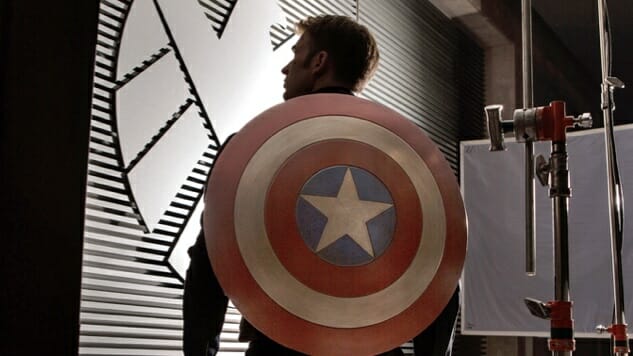I Want Captain America and Batman’s Retirement Plans
What the two most satisfying endings in superhero cinema teach us about storytelling

Note: This article contains spoilers for Avengers: Endgame, a movie that as of this writing has earned $2.5 billion worldwide.

One of the biggest triumphs of Avengers: Endgame is that despite being introduced to audiences just eight years ago, the resolution of the story arc of Chris Evans’ Captain America feels as if it resolves decades of hard-fought adventure and heartache. For lifelong fans of the character—the Cap who exists outside any single interpretation, not just the Evans portrayal—part of that is surely transitive: We’ve lived with this hero since childhood and can’t help but bring those feelings with us when we come to the theater. Another reason there wasn’t a dry eye in my screening as the movie cut to black was that it was the first movie in the whole 22-film run of the Marvel Cinematic Universe with an actual definitive ending.
It was also a reminder that my favorite subgenre of superhero storytelling, the one where the hero’s story actually has a satisfying resolution, is totally the best one. And yet, now that we’ve forced longform comic narratives into a shape that fits within a feature film, I’m pretty sure we’ll only get this kind of definitive resolution once a decade if we’re lucky.
The Eternal Fight Against Evil, at $4 Monthly

Comics as a medium were not designed around a perpetual narrative, but perpetual storytelling starring your favorite characters. The stories needed to make sense and make you want to buy the next issue. An ongoing story, one that took multiple issues or even years, used to be unheard of, veteran DC Comics writer Dennis O’Neil wrote in The DC Comics Guide to Writing Comics. With the rise of comics as a niche, that changed markedly, he said.
“The end of a story is the perfect ‘jumping off’ place,” he said, grappling honestly with one writing tactic he called “deadly” when it’s done badly. “The obvious tactic is to avoid providing that place.”
More successful and important than any other translation to the screen that Marvel has managed since 2008’s Iron Man—more than the wacko villains, the glowing magic gems from space, has been the studio’s success in carrying over its perpetual motion machine approach to plot. To dive into the Marvel Cinematic Universe is to basically be assured that you’ll never need to worry about running out of movies to watch or lore to follow.
The trouble is that this means the stories don’t really end, and this calls into question whether or not they’re actually complete stories to begin with. A hero can triumph over the antagonist of the moment, but they aren’t really allowed to resolve their major arc, or they presumably would have no reason to continue putting on the tights (or power armor).
The Tony Stark of the cinematic universe is the poster child here, in ways that are deeply tragic when you really examine them. In the three movies he headlines, Robert Downey Jr.’s billionaire inventor seems to undergo change, eventually abandoning his Iron Man persona to embrace a life with Pepper Potts. This is then completely undone in the subsequent movies, as he continues producing robo-suits and taking on the problems of the world at the expense of his own happiness. Stark’s literal last act, the one which saves the day and ends in his self-sacrifice, is to declare that he is Iron Man. Even with a wife and kid and some semblance of a happy life, he couldn’t get past the suit, and it killed him.
-

-

-

-

-

-

-

-

-

-

-

-

-

-

-

-

-

-

-

-

-

-

-

-

-

-

-

-

-

-

-

-

-

-

-

-

-

-

-

-










































